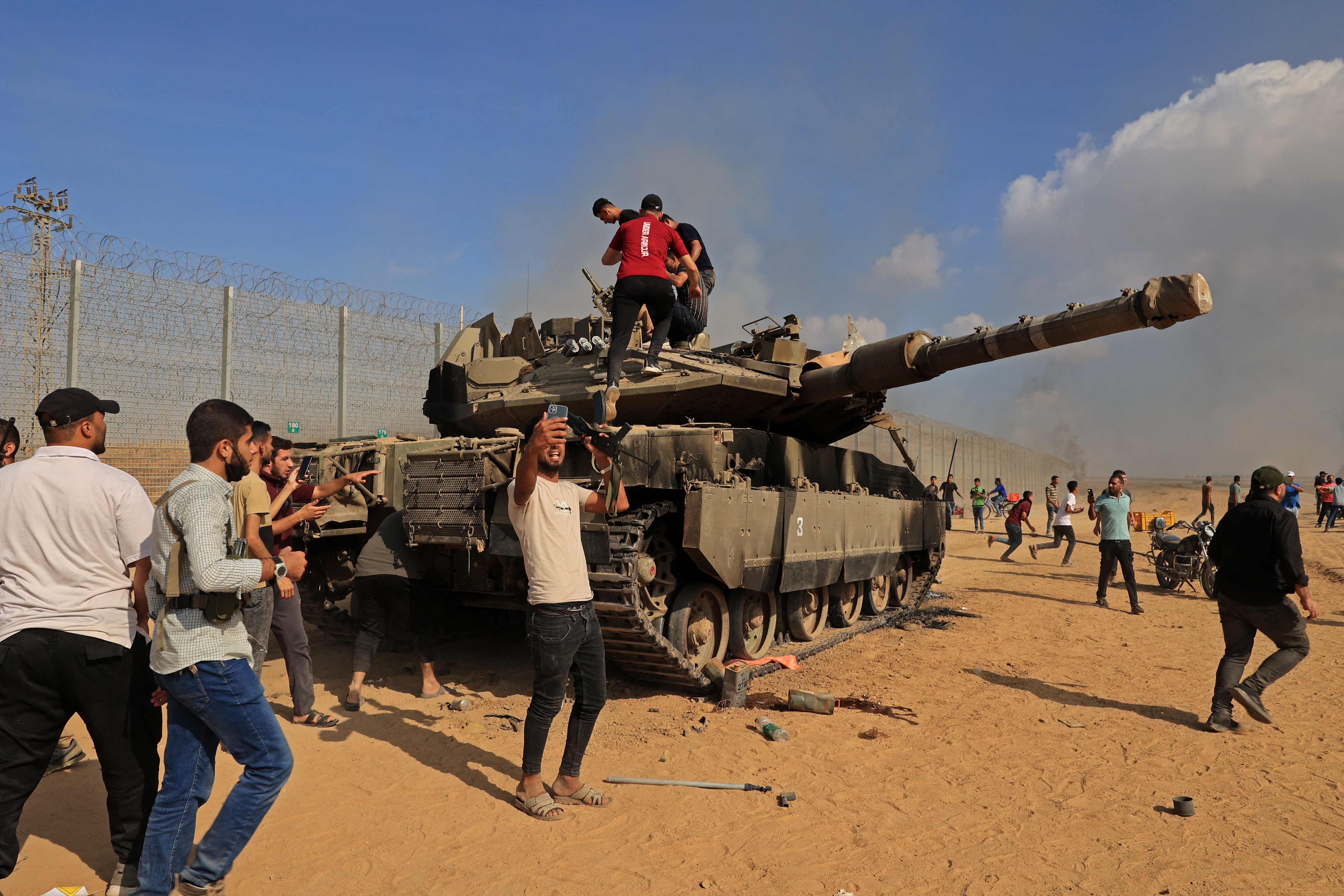The Humanitarian Crisis In Gaza: Examining The Effects Of The Israeli Blockade

Table of Contents
The Impact on Essential Resources and Infrastructure
The Israeli blockade has created a severe shortage of essential resources and crippled the infrastructure of Gaza, impacting every aspect of daily life. The consequences are widespread and devastating, affecting the most vulnerable populations disproportionately.
Food Security and Malnutrition
The blockade restricts access to crucial food imports, leading to widespread food insecurity and malnutrition. This is particularly acute among children and vulnerable families.
- High rates of childhood stunting and wasting: Studies consistently show alarming rates of malnutrition among children in Gaza, hindering their physical and cognitive development. This long-term impact has devastating consequences for future generations.
- Reliance on food aid: A significant portion of the Gazan population relies on humanitarian aid for their daily sustenance, highlighting the severity of the food crisis. This dependence is unsustainable in the long term.
- Limited agricultural production due to restrictions on seeds and fertilizers: The blockade restricts the import of essential agricultural inputs, limiting local food production and increasing reliance on imports. This further exacerbates food insecurity.
- Price inflation of available food: The limited supply and high demand for food have driven prices up, making it even more difficult for low-income families to afford adequate nutrition.
Access to Healthcare
The healthcare system in Gaza is severely strained due to the blockade, leading to significant health challenges. The restrictions on medical supplies and movement of people have devastating consequences.
- Shortages of essential medicines: Many essential medicines are in short supply, forcing healthcare providers to make difficult choices about who receives treatment.
- Lack of specialized medical equipment: The lack of modern medical equipment hinders the ability to provide adequate healthcare, particularly for complex medical cases.
- Difficulty accessing specialized care abroad: Restrictions on the movement of patients prevent many from accessing specialized medical care outside of Gaza.
- Overcrowded hospitals and clinics: The limited healthcare resources are overwhelmed by the high demand, leading to overcrowded facilities and substandard care.
Water and Sanitation
The blockade has severely impacted the water and sanitation infrastructure in Gaza, resulting in a public health crisis.
- Damage to water infrastructure due to conflict: Repeated conflicts have damaged essential water infrastructure, further limiting access to clean water.
- Limited access to potable water: A significant portion of the population lacks access to clean and safe drinking water, increasing the risk of waterborne diseases.
- High rates of waterborne illnesses: The lack of clean water and inadequate sanitation systems contribute to high rates of waterborne illnesses, particularly among children.
- Inadequate sewage treatment facilities: The limited capacity of sewage treatment plants leads to pollution of the environment and further compromises public health.
Electricity Shortages
Chronic electricity shortages cripple daily life in Gaza, impacting every sector from healthcare to education.
- Limited fuel imports for power generation: Restrictions on fuel imports limit the capacity of the power plant, leading to persistent power outages.
- Reliance on expensive and unreliable private generators: Many residents rely on expensive private generators, which are not only costly but also contribute to air pollution.
- Disruption of essential services like hospitals and water pumps: Power outages disrupt essential services, impacting healthcare, water supply, and sanitation.
- Impact on education and economic activity: Power outages significantly hinder education and economic activity, further exacerbating the humanitarian crisis.
Economic Consequences and Unemployment
The blockade has had a catastrophic impact on the Gazan economy, leading to widespread poverty and unemployment.
Restrictions on Trade and Economic Activity
The blockade severely restricts the export of Gazan goods, crippling the local economy.
- Limited access to international markets: The blockade prevents Gazan businesses from accessing international markets, limiting their ability to compete and grow.
- Restrictions on fishing zones: Restrictions on fishing zones limit the income of fishermen, a crucial sector of the Gazan economy.
- Unemployment exceeding 50%: The economic stagnation has led to extremely high unemployment rates, leaving a large portion of the population without any means of livelihood.
- Lack of investment and economic opportunities: The lack of economic opportunities discourages investment and perpetuates the cycle of poverty.
Poverty and Inequality
The economic hardship caused by the blockade has increased poverty rates and widened the gap between the rich and poor.
- High rates of poverty: A significant portion of the Gazan population lives below the poverty line, struggling to meet basic needs.
- Limited access to social safety nets: Weak social safety nets exacerbate the effects of poverty and inequality.
- Widening gap between rich and poor: The blockade disproportionately affects low-income families, widening the gap between the rich and poor.
- Increased vulnerability to exploitation: Economic hardship increases the vulnerability of many to exploitation and abuse.
Social and Psychological Impacts
The prolonged conflict and the economic hardship caused by the blockade have had a devastating impact on the mental and social well-being of the Gazan population.
Mental Health Crisis
The ongoing stress and uncertainty have caused a significant mental health crisis.
- High prevalence of PTSD, anxiety, and depression: The continuous exposure to violence, poverty, and uncertainty has led to a high prevalence of mental health disorders.
- Limited access to mental healthcare services: Limited access to mental healthcare services exacerbates the situation.
- Lack of psychosocial support: Many lack access to crucial psychosocial support mechanisms.
- Intergenerational trauma: The trauma experienced by one generation is often passed down to subsequent generations.
Education and Development
The blockade hinders the development of future generations by significantly impacting the education system.
- Damage to schools and educational infrastructure: Conflicts have damaged schools and educational infrastructure, interrupting education for many students.
- Shortage of qualified teachers: The blockade has affected the availability of qualified teachers, impacting the quality of education.
- Limited access to educational resources: The blockade restricts access to educational resources and technologies, hindering learning.
- High dropout rates: The economic hardship and lack of opportunities often force students to drop out of school.
Conclusion
The humanitarian crisis in Gaza, significantly intensified by the Israeli blockade, presents a grave and multifaceted challenge. The blockade's devastating effects on essential resources, the economy, and the mental and physical well-being of the Gazan population cannot be ignored. Addressing this crisis requires a concerted international effort to lift the blockade, improve access to essential services, and promote sustainable economic development. We must collectively work towards ending the humanitarian crisis in Gaza and fostering a path towards lasting peace and prosperity for its people. Let's demand an end to the blockade and prioritize humanitarian aid to alleviate the suffering caused by this protracted Gaza humanitarian crisis.

Featured Posts
-
 Decoding Aaron Judges Push Ups A 2025 Goal Revealed
May 11, 2025
Decoding Aaron Judges Push Ups A 2025 Goal Revealed
May 11, 2025 -
 Jeremy Stephens Ufc Return Fans React To Shocking Comeback
May 11, 2025
Jeremy Stephens Ufc Return Fans React To Shocking Comeback
May 11, 2025 -
 Fin D Une Epoque Au Bayern Thomas Mueller Annonce Son Depart Apres 25 Ans
May 11, 2025
Fin D Une Epoque Au Bayern Thomas Mueller Annonce Son Depart Apres 25 Ans
May 11, 2025 -
 The Next Pope Analyzing Nine Leading Contenders For The Papacy
May 11, 2025
The Next Pope Analyzing Nine Leading Contenders For The Papacy
May 11, 2025 -
 Confirmed Crazy Rich Asians Series Coming Soon Directed By Jon M Chu
May 11, 2025
Confirmed Crazy Rich Asians Series Coming Soon Directed By Jon M Chu
May 11, 2025
